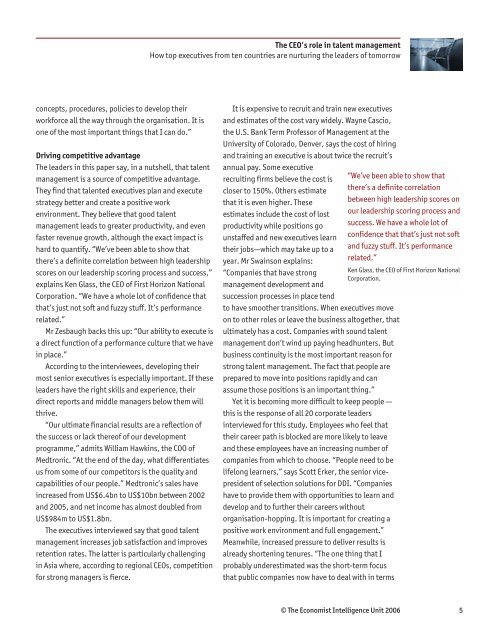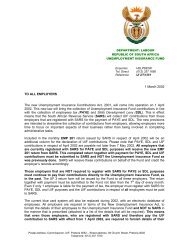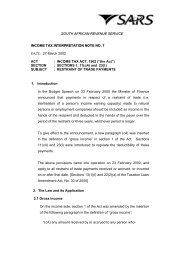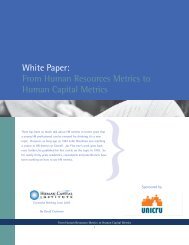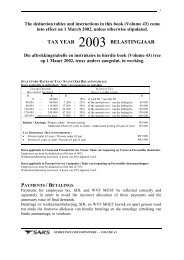The CEO's role in talent management - DDI
The CEO's role in talent management - DDI
The CEO's role in talent management - DDI
You also want an ePaper? Increase the reach of your titles
YUMPU automatically turns print PDFs into web optimized ePapers that Google loves.
<strong>The</strong> CEO’s <strong>role</strong> <strong>in</strong> <strong>talent</strong> <strong>management</strong><br />
How top executives from ten countries are nurtur<strong>in</strong>g the leaders of tomorrow<br />
concepts, procedures, policies to develop their<br />
workforce all the way through the organisation. It is<br />
one of the most important th<strong>in</strong>gs that I can do.”<br />
Driv<strong>in</strong>g competitive advantage<br />
<strong>The</strong> leaders <strong>in</strong> this paper say, <strong>in</strong> a nutshell, that <strong>talent</strong><br />
<strong>management</strong> is a source of competitive advantage.<br />
<strong>The</strong>y f<strong>in</strong>d that <strong>talent</strong>ed executives plan and execute<br />
strategy better and create a positive work<br />
environment. <strong>The</strong>y believe that good <strong>talent</strong><br />
<strong>management</strong> leads to greater productivity, and even<br />
faster revenue growth, although the exact impact is<br />
hard to quantify. “We’ve been able to show that<br />
there’s a def<strong>in</strong>ite correlation between high leadership<br />
scores on our leadership scor<strong>in</strong>g process and success,”<br />
expla<strong>in</strong>s Ken Glass, the CEO of First Horizon National<br />
Corporation. “We have a whole lot of confidence that<br />
that’s just not soft and fuzzy stuff. It’s performance<br />
related.”<br />
Mr Zesbaugh backs this up: “Our ability to execute is<br />
a direct function of a performance culture that we have<br />
<strong>in</strong> place.”<br />
Accord<strong>in</strong>g to the <strong>in</strong>terviewees, develop<strong>in</strong>g their<br />
most senior executives is especially important. If these<br />
leaders have the right skills and experience, their<br />
direct reports and middle managers below them will<br />
thrive.<br />
“Our ultimate f<strong>in</strong>ancial results are a reflection of<br />
the success or lack thereof of our development<br />
programme,” admits William Hawk<strong>in</strong>s, the COO of<br />
Medtronic. “At the end of the day, what differentiates<br />
us from some of our competitors is the quality and<br />
capabilities of our people.” Medtronic’s sales have<br />
<strong>in</strong>creased from US$6.4bn to US$10bn between 2002<br />
and 2005, and net <strong>in</strong>come has almost doubled from<br />
US$984m to US$1.8bn.<br />
<strong>The</strong> executives <strong>in</strong>terviewed say that good <strong>talent</strong><br />
<strong>management</strong> <strong>in</strong>creases job satisfaction and improves<br />
retention rates. <strong>The</strong> latter is particularly challeng<strong>in</strong>g<br />
<strong>in</strong> Asia where, accord<strong>in</strong>g to regional CEOs, competition<br />
for strong managers is fierce.<br />
It is expensive to recruit and tra<strong>in</strong> new executives<br />
and estimates of the cost vary widely. Wayne Cascio,<br />
the U.S. Bank Term Professor of Management at the<br />
University of Colorado, Denver, says the cost of hir<strong>in</strong>g<br />
and tra<strong>in</strong><strong>in</strong>g an executive is about twice the recruit’s<br />
annual pay. Some executive<br />
recruit<strong>in</strong>g firms believe the cost is<br />
closer to 150%. Others estimate<br />
that it is even higher. <strong>The</strong>se<br />
estimates <strong>in</strong>clude the cost of lost<br />
productivity while positions go<br />
unstaffed and new executives learn<br />
their jobs—which may take up to a<br />
year. Mr Swa<strong>in</strong>son expla<strong>in</strong>s:<br />
“Companies that have strong<br />
<strong>management</strong> development and<br />
succession processes <strong>in</strong> place tend<br />
to have smoother transitions. When executives move<br />
on to other <strong>role</strong>s or leave the bus<strong>in</strong>ess altogether, that<br />
ultimately has a cost. Companies with sound <strong>talent</strong><br />
<strong>management</strong> don’t w<strong>in</strong>d up pay<strong>in</strong>g headhunters. But<br />
bus<strong>in</strong>ess cont<strong>in</strong>uity is the most important reason for<br />
strong <strong>talent</strong> <strong>management</strong>. <strong>The</strong> fact that people are<br />
prepared to move <strong>in</strong>to positions rapidly and can<br />
assume those positions is an important th<strong>in</strong>g.”<br />
Yet it is becom<strong>in</strong>g more difficult to keep people —<br />
this is the response of all 20 corporate leaders<br />
<strong>in</strong>terviewed for this study. Employees who feel that<br />
their career path is blocked are more likely to leave<br />
and these employees have an <strong>in</strong>creas<strong>in</strong>g number of<br />
companies from which to choose. “People need to be<br />
lifelong learners,” says Scott Erker, the senior vicepresident<br />
of selection solutions for <strong>DDI</strong>. “Companies<br />
have to provide them with opportunities to learn and<br />
develop and to further their careers without<br />
organisation-hopp<strong>in</strong>g. It is important for creat<strong>in</strong>g a<br />
positive work environment and full engagement.”<br />
Meanwhile, <strong>in</strong>creased pressure to deliver results is<br />
already shorten<strong>in</strong>g tenures. “<strong>The</strong> one th<strong>in</strong>g that I<br />
probably underestimated was the short-term focus<br />
that public companies now have to deal with <strong>in</strong> terms<br />
“We’ve been able to show that<br />
there’s a def<strong>in</strong>ite correlation<br />
between high leadership scores on<br />
our leadership scor<strong>in</strong>g process and<br />
success. We have a whole lot of<br />
confidence that that’s just not soft<br />
and fuzzy stuff. It’s performance<br />
related.”<br />
Ken Glass, the CEO of First Horizon National<br />
Corporation.<br />
© <strong>The</strong> Economist Intelligence Unit 2006 5


